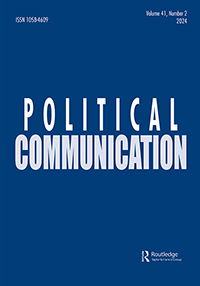The Unintended Consequences of Amplifying the Radical Right on Twitter
IF 5.1
1区 社会学
Q1 COMMUNICATION
引用次数: 0
Abstract
ABSTRACT The emergence of the radical right signals that social norms and values are changing. Existing literature suggests that citizens choose to voice their concerns when faced with the erosion of democracy. In this paper, we look at the consequences of citizens using quoted tweets to express negative sentiments to denounce and discredit the radical right. Using Twitter data from Portugal, we use node embeddings to map out interactions on social media. Subsequently, we estimate a deep-learning automated sentiment analysis of quoted tweets and use a vector auto-regression model to forecast who contributes the most to the growth of the radical right on Twitter. Our findings show that users amplify the radical right’s original message via weak ties and cascade effects in making negative quoted tweets. Ultimately, denouncing the radical right backfires and helps nascent illiberal parties to reach out to more users in the network and gain more users.在推特上放大激进右翼的意外后果
激进右翼的出现标志着社会规范和价值观正在发生变化。现有文献表明,当面临民主的侵蚀时,公民会选择表达他们的担忧。在这篇论文中,我们观察了公民使用引用的推文表达负面情绪来谴责和抹黑激进右翼的后果。使用葡萄牙的Twitter数据,我们使用节点嵌入来绘制社交媒体上的互动。随后,我们对引用的推文进行了深度学习自动情绪分析,并使用向量自回归模型预测谁对推特上激进右翼的增长贡献最大。我们的研究结果表明,用户在发布负面引用推文时,通过弱联系和级联效应放大了激进右翼的原始信息。最终,谴责激进右翼适得其反,有助于新生的非自由政党在网络中接触到更多用户,获得更多用户。
本文章由计算机程序翻译,如有差异,请以英文原文为准。
求助全文
约1分钟内获得全文
求助全文
来源期刊

Political Communication
Multiple-
CiteScore
13.90
自引率
2.70%
发文量
30
期刊介绍:
Political Communication is a quarterly international journal showcasing state-of-the-art, theory-driven empirical research at the nexus of politics and communication. Its broad scope addresses swiftly evolving dynamics and urgent policy considerations globally. The journal embraces diverse research methodologies and analytical perspectives aimed at advancing comprehension of political communication practices, processes, content, effects, and policy implications. Regular symposium issues delve deeply into key thematic areas.
 求助内容:
求助内容: 应助结果提醒方式:
应助结果提醒方式:


